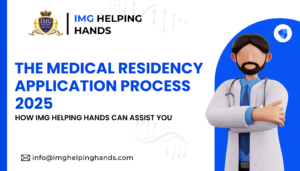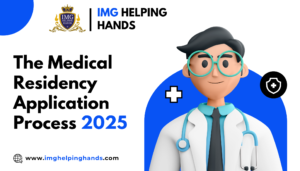
The Medical Residency Application Process 2025: How IMG Helping Hands Can Assist You
Have you ever wondered what it truly takes to secure your dream residency in an ever-evolving medical landscape? As we step into 2025, the residency

Have you ever considered the transformative power of aesthetics in the field of medicine? Is aesthetic medicine the silent cornerstone of modern clinical practice?
Within the ever-evolving field of medical education, residency programs serve as pivotal platforms for aspiring physicians to refine their skills, broaden their knowledge, and shape their careers. While the core curriculum lays a robust foundation, embracing aesthetics as a supplementary focus can greatly enrich your residency journey.
Join us in this blog as we explore the importance of aesthetic medicine in improving the US clinical residency journey and its profound impact on residents’ skills, confidence, and patient care.
From rejuvenating skin treatments to transformative cosmetic procedures, aesthetic medicine encompasses a diverse array of interventions aimed at enhancing physical appearance, instilling confidence, and promoting overall well-being. It’s a discipline that requires precision, creativity, and a deep understanding of anatomy and physiology. But who exactly can take up aesthetic medicine courses?
The field of aesthetic medicine welcomes a diverse range of individuals with varying backgrounds and expertise. Aspiring medical professionals such as medical students and recent graduates aiming to specialize in dermatology or plastic surgery, licensed practicing physicians from various specialties, and allied healthcare professionals, including nurses, nurse practitioners, and physician assistants, are all well-suited for aesthetic medicine courses. Moreover, individuals working in the beauty and wellness industry, such as estheticians and cosmetologists, can enhance their careers by adding medical aesthetics skills.
While non-physician practitioners can perform many aesthetic procedures, certain elements of aesthetic medicine are reserved exclusively for licensed physicians.
Aesthetic medicine courses are specialized training programs designed to provide medical professionals with comprehensive knowledge and practical skills in cosmetic procedures and treatments. Whether offered as part of formal residency curriculum or through external institutions, these courses offer hands-on training, didactic lectures, and mentorship from experienced practitioners. The field of aesthetic medicine offers various categories of education and training, each tailored to meet the diverse needs and interests of aspiring practitioners. They range from basic training courses to certification programs and fellowship programs. Standards of education in aesthetic medicine courses may vary depending on factors such as accreditation, curriculum content, faculty expertise, and training facilities.
Securing a residency position in the United States is a significant milestone for medical graduates. However, US residency is very competitive, requiring candidates to stand out amidst a sea of qualified applicants. Integrating aesthetic medicine courses into US residency training offers numerous benefits, from expanding clinical expertise to enhancing career opportunities and patient care. As you embark on this transformative journey, seize every opportunity to learn, grow, and elevate your residency experience to new heights.
Medical graduates can diversify their skillset beyond traditional medical specialties by participating in aesthetic medicine courses. Gaining expertise in aesthetic procedures increases their clinical adaptability and and prepares them to meet the growing demand for aesthetic treatments in both clinical and private practice settings.
Residents in aesthetic medicine courses are better equipped to provide their patients with a wider range of treatment options that address both medical concerns and aesthetic preferences. This strengthens patient-provider relationships.
Pro tip: Program directors prefer a versatile applicant, and residents who are able to provide holistic care that addresses patients’ physical and mental health are better suited.
In the competitive setting of US residency programs as an IMG, distinguishing yourself is essential for securing coveted fellowship positions in specialties such as dermatology, plastic surgery, or facial plastic surgery. Participation in aesthetic medicine courses demonstrates a proactive commitment to the field and enhances your chances, particularly for subspecialty fellowships focused on cosmetic procedures.
Attending aesthetic medicine courses provides residents with invaluable networking opportunities, allowing them to connect with attendings, program directors, and fellow residents in the field.
Pro tip: Effective networking is the key to golden gate of securing top spot as a US healthcare provider.
By starting early, you lay the foundation for expertise in this specialized field, positioning yourself for a fulfilling career. Begin your journey with intention, dedication, and a commitment to mastering the intricacies of aesthetic medicine, paving the way for a rewarding and impactful residency experience.
To make your US clinical residency journey more useful by focusing on aesthetic medicine, consider the following steps:
Look for residency programs that offer exposure to aesthetic medicine and have faculty members with expertise in the field. Consider factors such as program reputation, available elective rotations in dermatology or plastic surgery, and opportunities for hands-on experience in aesthetic procedures.
Participate in workshops, seminars, and conferences focused on aesthetic medicine during your residency. These events provide valuable opportunities to learn from experts in the field, stay updated on the latest advancements, and network with fellow professionals.
Identify mentors within your residency program or through professional organizations who have experience in aesthetic medicine. Establishing mentor-mentee relationships can provide guidance, support, and career development opportunities in this specialized field.
Engage in research projects related to aesthetic medicine during your residency. Conducting research not only contributes to the advancement of the field but also enhances your understanding of evidence-based practices, strengthens your academic credentials and builds a strong resume.
Take every opportunity to observe and assist in aesthetic procedures performed. This hands-on experience allows you to learn proper techniques, patient management skills, and safety protocols under supervision.
Pro tip: Hands on experience has no better alternative throughout US clinical experience
Consider pursuing additional training or certification courses in aesthetic medicine outside of your residency program. Look for reputable institutions or organizations that offer comprehensive training in injectables, laser therapy, skin rejuvenation, and other aesthetic procedures.
How to Get: Research accredited certification programs by professional organizations such as the American Academy of Dermatology (AAD) or the American Society for Dermatologic Surgery (ASDS). Residents can pursue these programs during elective rotations or through online/remote learning options.
During US clinical residency, residents can pursue various courses in aesthetic medicine to enhance their skills and knowledge. It’s essential to research each course thoroughly to ensure it aligns with your interests, goals, and level of experience. Additionally, always verify the accreditation and reputation of the organization offering the course before enrolling.
Course outline: AAFE offers comprehensive training in injectables (Botox, dermal fillers), facial anatomy, and other aesthetic procedures.
Website: https://www.facialesthetics.org/courses-events/
Course outline: AAD offers workshops and seminars covering various aspects of dermatologic surgery and cosmetic procedures.
Website: https://www.aad.org/member/education/residents/bdc
Course outline: ASDS provides educational opportunities in cosmetic dermatology, laser surgery, and other aesthetic procedures.
Website: https://www.asds.net/medical-professionals/education
Course outline: ASPS offers educational resources and courses on plastic surgery topics, including aesthetic procedures.
Website: https://www.plasticsurgery.org/for-medical-professionals/education
Course outline: IAPAM offers training in injectables, laser and light-based therapies, and other aesthetic procedures.
Website: https://iapam.com/training
Course outline: ASLMS offers educational programs and workshops focused on laser and energy-based treatments in aesthetic medicine.
Website: https://www.aslms.org/for-professionals/education-center
Together, let’s redefine the clinical residency journey and elevate the standards of medical education through the transformative power of aesthetic medicine. Incorporating aesthetic medicine into the US clinical residency is not merely about mastering cosmetic procedures; it’s about embracing a philosophy of holistic care, artistic expression, and patient empowerment.
At IMGHH, we recognize the importance of aesthetic medicine in residency training and are committed in shaping the future of healthcare, one resident at a time. Join our mentorship opportunities, as we provide residents with the knowledge, skills, and confidence to thrive in the dynamic field of aesthetic medicine.
Get our most valuable tips right inside your inbox, once per month!

Have you ever wondered what it truly takes to secure your dream residency in an ever-evolving medical landscape? As we step into 2025, the residency

For IMGs, to practice medicine in USA is more than just passing USMLE and securing a residency; it also involves surfing through the intimidating visa

Are you ready to embark on one of the most transformative journeys in your medical career? The residency match process is a pivotal step for

Pursuing medical research in the United States offers unparalleled opportunities for academic growth, access to cutting-edge technology, and the ability to work alongside leading experts

Embarking on a journey to practice dentistry in the United States is a dream for many international dentists. In the vast landscape of American dentistry,

Have you ever considered the transformative power of aesthetics in the field of medicine? Is aesthetic medicine the silent cornerstone of modern clinical practice? Within
We are here to provide a safe and secure helping hand for medical students, graduates, and residents.
Our comprehensive guide will assist you in matching with your top-choice residency or fellowship program.




Payment Methods
Buy with Confidence
© IMG Helping Hands Copyrights 2024 Developed By Ecom Thrust